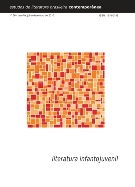O mundo nas mãos do adolescente: entre Apolo e Dioniso, entre o eros e o caos
entre Apolo e Dioniso, entre o eros e o caos
Abstract
A partir da série Poderosa, de Sérgio Klein, analiso a representação do adolescente na personagem-heroína Joana Dalva, que tem o dom de mudar os acontecimentos através da escrita. A análise parte da polaridade Apolo/Dioniso conforme Friedrich Nietzche e começa por apresentar a série em seu contexto gráfi co, mostrando como ele contribui para a identifi cação entre texto e destinatário; a seguir, apresento a protagonista em suas relações com os demais elementos narrativos, refl etindo sobre o modo como ela exerce seu poder e seu signifi cado enquanto metáfora dos confl itos psíquicos e corpossensuais causados pelas transformações próprias da idade. O trabalho inclui um breve panorama historiográfi co da juventude a partir das relações do seu corpo com o corpo coletivo, ou sociocultural, auxiliando a localizar a obra de Klein na pós-modernidade e confi rmando-o como sintoma de uma visão apolinizada do adolescente pela sociedade contemporânea. Para concluir, junto com o relato das informações obtidas a partir de uma rápida enquete feita com bibliotecárias de Porto Alegre e de outras cidades do Rio Grande do Sul, situo a série no sistema literário e procuro diagnosticar as causas do seu êxito junto ao jovem público leitor.
Downloads
References
HUTCHEON, Linda (1990). The politics of postmodernism. Londres/Nova Iorque: Routledge.
KAPLAN, Louise (2004). Adolescencia: el adiós a la infancia. Buenos Aires: Paidós.
KLEIN, Sérgio (2008a). Poderosa 1: diário de uma garota que tinha o mundo na mão. São Paulo: Fundamento.
________ (2008b). Poderosa 2: diário de uma garota que tinha o mundo na mão. São Paulo: Fundamento.
________ (2007). Poderosa 3: diário de uma garota que tinha o mundo na mão. São Paulo: Fundamento.
________ (2008c). Poderosa 4: diário de uma garota que tinha o mundo na mão. São Paulo: Fundamento, 2008c.
MAZZARELLA, Sharon R. et al. (2009). Os jovens e a mídia. Porto Alegre: Artmed.
NIETZCHE, Friedrich (2006). O nascimento da tragédia: ou helenismo e pessimismo. São Paulo: Companhia das Letras.
OBIOLS, Silvia (2006). Adultos en crisis: jóvenes a la deriva. Buenos Aires: Noveduc.
ONFRAY, Michel (1999). A arte de ter prazer. São Paulo: Martins Fontes.
PALMA, Brian de. (1976) Carrie. California: MGM.
ZUSAK, Markus (2002). Eu sou a mensagem. Rio de Janeiro: Intrínseca.
LEVI, Giovanni; SCHMIDT, Jean-Claude (org.) (1996). Historia de los jóvenes: de la antigüedad a la edad moderna, vol. 1. Madri: Taurus.
Downloads
Published
How to Cite
Issue
Section
License
Authors who publish in this journal agree to the following terms:
a) The authors maintain the copyright and grant the journal the right of first publication, the work being simultaneously licensed under the Creative Commons Attribution License-Non Commercial 4.0 which allows the sharing of the work with acknowledgment of the authorship of the work and publication this journal.
b) Authors are authorized to enter into additional contracts separately, for non-exclusive distribution of the version of the work published in this journal (eg publish in institutional repository or as a book chapter), with authorship recognition and publication in this journal.
c) Authors are allowed and encouraged to publish and distribute their work online (eg in institutional repositories or on their personal page) after the editorial process, as this can generate productive changes, as well as increase the impact and citation of published work (See The Effect of Free Access).
d) The authors of the approved works authorize the magazine to, after publication, transfer its content for reproduction in content crawlers, virtual libraries and the like.
e) The authors assume that the texts submitted to the publication are of their original creation, being fully responsible for their content in the event of possible opposition by third parties.


